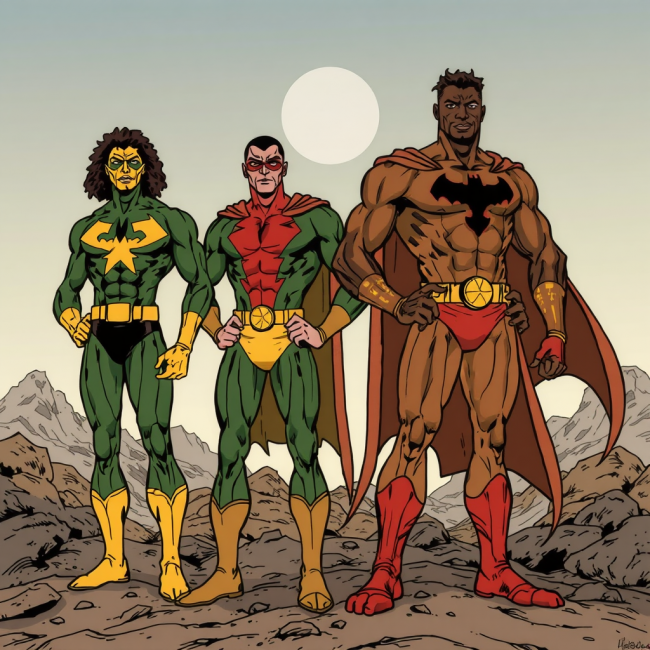Nubian Heroes

“It’s a bird…It’s a plane…Its superman!” Remember that line? Remember the unmistakable rush of adrenaline you got when you saw superman donned in his suit and his flowing red cape billowing about him; even within the confines of paper, he looked downright invincible.
Ever since their creation, millions of lives have been shaped through comics.
Didn’t they make us all want to save that cat in the tree like superman? Defeat all those elementary school bullies like batman?
Stop crime like our friendly neighborhood Spiderman? These characters etched in paper became something more than just entertainment to us; they became our idols, role models, best friends… our heroes.
Over the years our African culture has been interpreted in paintings, poems, plays, movies, sculptures and prose. But one aspect that hasn’t really been focused on is the graphic novels (commonly known as comics). The Nubian superheroes- African superheroes have been portrayed as far back at the sixties.
In 1966, the first black superhero in mainstream American comics made its debut: Black Panther. Even in the creation of this character Stan Lee didn’t over look the main part of our Nubian heritage: our power. Black Panther was virile, strong, and agile; he moved with the grace of a jungle cat, he was resistant to magic and acquired his powers of a special herb. Nubia was portrayed through this character as the moon would reflect off the sun’s light. The Black Panther (AKA T’challa) reflected the mysticism of our magic, our connection with the earth and all her deities, our powerful African bodies: He spoke of the power of our ancestors. For ages ago, long before the year 1966, our people all over Africa were not so far-fetched from this hero… Relying only on the earth as our source; we developed and honed our human abilities to a level that can hardly be acquired today. Forced to thrive under the harsh tropical sun we became hard skinned, callous footed, our hair became thick and full. We sported dreadlocks, braids, afros. Our immunity became so strong that we could withstand deadly snake bites and poisonous herbs. We hunted for our food and farmed our own acres; our bodies barely felt the stings of scorpions or the hardness of stones beneath our feet, our backs withstood the harsh glare of the sun neither and our eyes remained unblinking when our salty sweat invaded it. Our forefathers’ physiques were the basis of that of Captain America, our intelligence ascribed to Bane’s (Batman); we had herbalists, mystical powers and revered our elders. Zulu men covered distances close to 50 miles a day… barefoot. In short: We were powerful.
Aside from Black Panther, many others have been created such as Brother Voodoo (Now known as Dr Voodoo) and Storm (Ororo Munroe), an extremely popular character in Marvel’s X-men, who is portrayed as a woman who controls the elements of weather, she is a representation of our often spoken about connection to the earth.
The most noticeable development of Africa in the world of comic book heroes is the portrayal of the Orishas. In the Yoruba land, the Orisha is a spirit or deity that reflects one of the manifestations of Olodumare (God). It is estimated there are over 100 million believers of this spiritual tradition worldwide. Over fifteen (15) of these Orishas have been adapted into DC comics making appearances with different superheroes such as Shango’s (Yoruba god of thunder) encounter with DC comic character, Firestorm. Some of the other Orishas which have been portrayed in DC comics are Adiremi, Agemo, Erinle, Mawu, Molo, Moremi, Obatala of the white cloth, Ogun, Oshun, and Olorun.
In all these things our awareness is slowly being awakened for the reality is: Though entertaining and enjoyable, many don’t realize that this is absolutely necessary for promoting Nubia to the youth. As we strive to restore our former glory, our attributes are being used to create countless modern and olden day super heroes in the comic world. Nubian culture is being portrayed in a way that is highly entertaining yet we must ensure that it retains its truth and the depths of our values. For Nubian culture isn’t ‘fading’ neither is it lost. Sadly, we’ve simply chosen to ignore it. If we do not work at keeping it alive, the time will come inevitably when without noticing it dying or withering away, it’ll simply disappear.
